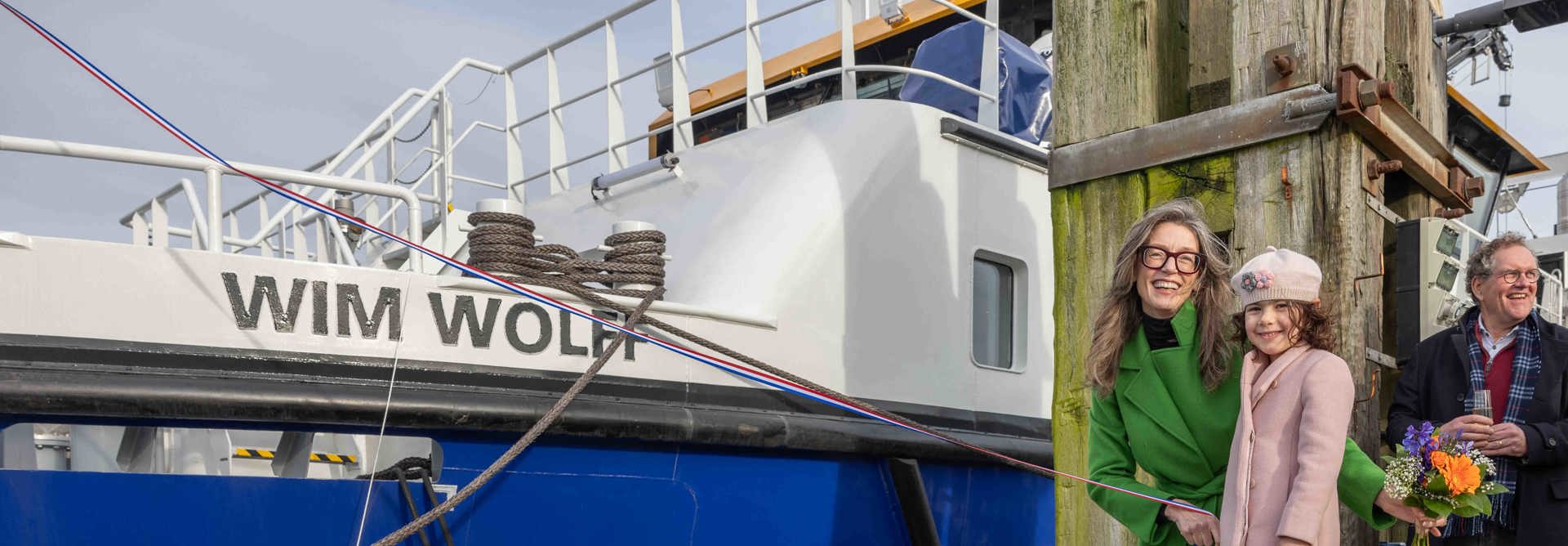Nioz christens RV Wim Wolff built by Thecla Bodewes Shipyards
On 15 February, the new national research vessel, RV Wim Wolff, was christened in the harbour of the Royal Netherlands Institute for Sea Research (NIOZ) on Texel. The ship, built by Thecla Bodewes Shipyards, replaces research vessel RV Navicula after 40 years of faithful service in the Wadden Sea and in the Zeeland Delta.
RV Wim Wolff is equipped to facilitate high-quality marine research in Dutch waters, especially in the Wadden Sea and the Zeeland Delta. This vessel will provide Dutch coastal researchers with a versatile, modern and sustainable research vessel for decades to come. The expected service life of RV Wim Wolff will exceed 30 years.
Unique Ship
With a length of 37 metres and a shallow draft of 1 metre, the RV Wim Wolff is a unique vessel. With an aluminium hull and accommodation, the vessel is also equipped with an impressive range of deck equipment that can be used for various research purposes. Specifically for research in the Wadden Sea, the RV Wim Wolff has the ability to easily go aground for extended periods of time, with batteries providing the vessel with the necessary energy to continue operating the ship's equipment.
Minimal energy consumption and emissions
Using a sustainable diesel-electric propulsion system combined with an advanced battery pack, RV Wim Wolff has minimal energy consumption and emissions. Unlike similar vessels, the RV Wim Wolff runs on a non-fossil fuel, making it extremely sustainable. RV Wim Wolff uses Hydrotreated Vegetable Oils, also known as HVO, as fuel for the generator sets. This 100% synthetic fuel is made from bio-products and is suitable for diesel engines. The combined energy-saving solutions, together with the advanced diesel-electric propulsion system, are environmentally friendly and result in sustainable savings for NIOZ's National Marine Facilities department, which manages the vessel.
Modular energy concept for the future
As marine fuels are rapidly evolving towards cleaner types, further reducing CO2 emissions, energy supplies may become obsolete several times during the life cycle of the RV Wim Wolff. Thecla Bodewes Shipyards has therefore developed a modular energy concept with propulsion independent of fuel type. This allows the use of alternative energy systems without the need for major conversion of the ship. The ship can be adapted to new technologies and energy sources, such as hydrogen or methanol, without major conversions, preparing the RV Wim Wolff for a zero-emission future.
Less noise and vibration
During the intensive design phase of the vessel, great attention was paid to eliminating vessel noise in the water to minimise disturbance to the marine environment. By balancing propeller and engine speed, propeller noise and vibration are significantly reduced. This also contributes to the quality of the research that can be conducted aboard RV Wim Wolff.
Godmothers
Speakers at the christening ceremony in Texel included godmother Caroline Visser, a member of the board of the Netherlands Association for Scientific Research (NWO), and Charly Wolff, granddaughter of ecologist Wim Wolff, after whom the ship is named. The event was attended by friends and family of the godmother, representatives of the NWO, NIOZ, Thecla Bodewes Shipyard and other interested guests.
